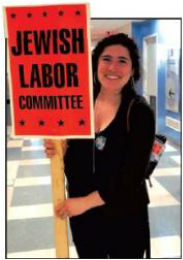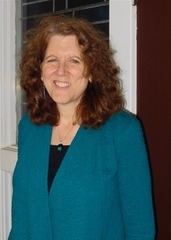
By Molly Schulman
“I am what time, circumstance, history, have made of me, certainly, but I am also, much more than that. So are we all.” –James Baldwin
A couple months ago, I called my nanny, Rita, on the phone. I was beginning a new family history project in which I sought to explore the complicated relationships between the women in my Ashkenazi Jewish family and the African American women who worked alongside them as domestics in their homes. Rita had moved back to Dallas, Texas after my younger brother and I had both graduated high school. As she reflected on the twenty years she spent in our home, she told me, “My real thing is that I still hold a great love for everybody that I have dealt with on the east coast. […] It’s like we were all supposed to be right there. We just different colors but we right there together. Something binds us all together.”
Growing up, Rita’s life felt intertwined with my own. She was there for play dates, doctor’s appointments, birthdays, and guitar lessons. She was the first one who would hear about my day when I got home from school and she was the keeper of my secrets. Yet, when Rita went into her room at the end of the day, I didn’t know what television shows she turned on or who she talked to on her cell phone. I felt like she knew everything about me and yet I didn’t know how she felt about her mother or what made her scared or her reflections on how she had raised her own children who were having their own children by the time Rita started working for my family. It wasn’t until later that I found out that before working for my family, she had had to work multiple service jobs to make ends meet for her three children. While she was there every day to help raise my brother and me, she had not been able to give her own children that same attention.
Rita was more than just someone who worked for my mother. She taught me how to stand up for myself, to see the humor in life’s troubles, and to see the great pleasure in giving more than receiving. She became a part of my family and I am still working on how I can show her how much she really means to me.
Since my mother’s family immigrated to Elgin, Texas from Torn, Germany in the late 1800’s, all of the women in my family have employed African American women to work as domestics in their homes. Writing this history has given me the chance to see these relationships in their nuance and complexity. From Rita, my mother, and my grandmother, I have heard stories of pain and comfort, anger and love coexisting in one relationship. At the same time, I have seen how each individual relationship between the women in my family and the African American women have been infused with systemic racism and class difference. My family is not unique in our implication in these systems—but that does not take away our responsibility to grapple with this legacy, to examine the ways we continue to hold up white supremacy whether knowingly or not in our own lives.
Working on this project has left me with more questions than answers. How do we address the American Jewish community’s implication in upholding systems of power? With Ashkenazi Jews having a history marked by both resistance and assimilation, where does that leave us now? What could collective healing look like both inside and outside the Jewish community? How am I going to teach my own children about their history? These are questions that I need to keep willing myself to answer, recognizing that my answers will change as I continue developing as an American Jewish woman.
Now, working at the Jewish Labor Committee I am excited to learn that I am not alone in my investment in this topic. The JLC and Matahari, an organization that works on behalf of domestic workers, are working together to record stories of domestic workers and their employers through their oral history project, Domestic Workers and Their Employers: Exploring the Realities of Work, Family, Care, and Communities. The two organizations will be sharing what they’ve learned at a forum near the end of the year. It’s affirming to know that my personal story is part of a larger story that needs to be told, in the Jewish community and beyond.
Molly Schulman is currently working as Marya Axner’s assistant at the New England JLC. She has previously served as one of the co-presidents of the Tufts Labor Coalition and as an educator for the Leaders-in-Training program at Solar Youth. She is excited to start her position as a Team Leader with City Year New York starting this July.
“I am what time, circumstance, history, have made of me, certainly, but I am also, much more than that. So are we all.” –James Baldwin
A couple months ago, I called my nanny, Rita, on the phone. I was beginning a new family history project in which I sought to explore the complicated relationships between the women in my Ashkenazi Jewish family and the African American women who worked alongside them as domestics in their homes. Rita had moved back to Dallas, Texas after my younger brother and I had both graduated high school. As she reflected on the twenty years she spent in our home, she told me, “My real thing is that I still hold a great love for everybody that I have dealt with on the east coast. […] It’s like we were all supposed to be right there. We just different colors but we right there together. Something binds us all together.”
Growing up, Rita’s life felt intertwined with my own. She was there for play dates, doctor’s appointments, birthdays, and guitar lessons. She was the first one who would hear about my day when I got home from school and she was the keeper of my secrets. Yet, when Rita went into her room at the end of the day, I didn’t know what television shows she turned on or who she talked to on her cell phone. I felt like she knew everything about me and yet I didn’t know how she felt about her mother or what made her scared or her reflections on how she had raised her own children who were having their own children by the time Rita started working for my family. It wasn’t until later that I found out that before working for my family, she had had to work multiple service jobs to make ends meet for her three children. While she was there every day to help raise my brother and me, she had not been able to give her own children that same attention.
Rita was more than just someone who worked for my mother. She taught me how to stand up for myself, to see the humor in life’s troubles, and to see the great pleasure in giving more than receiving. She became a part of my family and I am still working on how I can show her how much she really means to me.
Since my mother’s family immigrated to Elgin, Texas from Torn, Germany in the late 1800’s, all of the women in my family have employed African American women to work as domestics in their homes. Writing this history has given me the chance to see these relationships in their nuance and complexity. From Rita, my mother, and my grandmother, I have heard stories of pain and comfort, anger and love coexisting in one relationship. At the same time, I have seen how each individual relationship between the women in my family and the African American women have been infused with systemic racism and class difference. My family is not unique in our implication in these systems—but that does not take away our responsibility to grapple with this legacy, to examine the ways we continue to hold up white supremacy whether knowingly or not in our own lives.
Working on this project has left me with more questions than answers. How do we address the American Jewish community’s implication in upholding systems of power? With Ashkenazi Jews having a history marked by both resistance and assimilation, where does that leave us now? What could collective healing look like both inside and outside the Jewish community? How am I going to teach my own children about their history? These are questions that I need to keep willing myself to answer, recognizing that my answers will change as I continue developing as an American Jewish woman.
Now, working at the Jewish Labor Committee I am excited to learn that I am not alone in my investment in this topic. The JLC and Matahari, an organization that works on behalf of domestic workers, are working together to record stories of domestic workers and their employers through their oral history project, Domestic Workers and Their Employers: Exploring the Realities of Work, Family, Care, and Communities. The two organizations will be sharing what they’ve learned at a forum near the end of the year. It’s affirming to know that my personal story is part of a larger story that needs to be told, in the Jewish community and beyond.
Molly Schulman is currently working as Marya Axner’s assistant at the New England JLC. She has previously served as one of the co-presidents of the Tufts Labor Coalition and as an educator for the Leaders-in-Training program at Solar Youth. She is excited to start her position as a Team Leader with City Year New York starting this July.


 RSS Feed
RSS Feed
